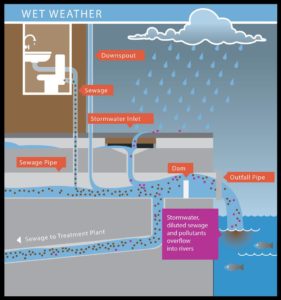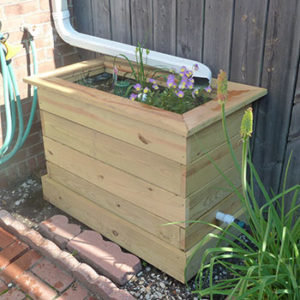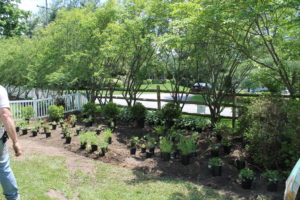Go Philly! Did you know that the city of Philadelphia leads the nation in:
- Commuter Biking
- Per capita consumption of sweatshirts and sweatpants
- Life sciences research and development
- Stormwater management
Pretty cool stuff! And although I certainly have opinions about the whole list, I can only speak intelligently about the last item, so let me explain a little about Philadelphia’s Green City, Clean Waters program, and how this applies to you.
First, what is the problem?
In Philadelphia, the problem is huge. The city (and many other cities) currently has what is called a combined sewer system, which means the same underground pipe system manages the sanitary sewer and stormwater. In dry weather, this works fine. The sanitary sewage is directed to water treatment plants and treated. But in wet weather, snow melt or rainwater runs into the same system which no longer has the capacity to treat this additional volume, and the system overflows into local waterways.
Currently, there are 164 combined sewer outfalls (CSOs) along the Delaware and Schuylkill rivers and the Cobbs, Tookany/Tacony-Frankford, and lower Pennypack creeks. This means that following even minimal rain events, combined overflow can make these waterways unclean and unsafe.
Traditionally, cities have expanded their combined sewer systems to manage greater volumes as development increases. The problem is this is an extremely expensive undertaking requiring large construction projects, and success remains limited to the cost and the size of the infrastructure. Once the improved system reaches capacity, it once again ceases to function properly.
What is the solution?
To address the problem, Philadelphia has initiated the Green City, Clean Waters program, and become a national leader in stormwater management. The idea is to address the issue of stormwater before it enters the sewer system and at the same time save money and improve the city through greening programs and jobs. This 25 year program intends to make Philadelphia the greenest city in the country and includes a large scale street tree program, conversion of vacant and abandoned lots, restored streams and more.
Local businesses leading the movement of improving stormwater infrastructure have joined together to form the Green Stormwater Infrastructure Partners (GSI Partners), an initiative through Sustainable Business Network of Greater Philadelphia. This group includes architects, engineers, contractors, material suppliers, and others who work together to create some of the impressive projects being designed and installed around the region. Additionally, these businesses work collectively through GSI Partners to help the city enhance its standards and policy.
Here is how it works: Green Stormwater Infrastructure
Green stormwater infrastructure includes a range of soil-water-plant systems that intercept stormwater, infiltrate a portion of it into the ground, evaporate a portion of it into the air, and in some cases release a portion of it slowly back into the sewer system.
Basically, plants are the answer. By reducing hard and impervious surfaces and planting these areas, the stormwater is now captured before it reaches the sewer systems and local waterways. The plants slow the water down, absorb much of it, and allow the rest to percolate into the soil.
How does this apply to me?
As Philadelphia becomes a national leader in stormwater management, many other cities, locally and nationally, are taking note and following suit. Additionally, even municipalities that do not have combined sewer systems are covered under Municipal Separate Storm Sewer (MS4) programs which also benefit from green stormwater infrastructure. Essentially, all municipalities must now manage stormwater to meet the EPA requirements of the federal Clean Water Act.
In Pennsylvania, the MS4 program is managed by the PA Department of Environmental Protection covering close to 1,000 jurisdictions. Since part of this program requires public education and public participation, municipalities strive for involvement in stormwater management even at the residential level.
Residents in the city of Philadelphia may take part in the Philadelphia Water Department’s Rain Check program. This program offers workshops on stormwater management at home. By attending these workshops, residents may receive a free rain barrel or get a downspout planter, rain garden, or porous pavement installed at a reduced cost.
Whether you live in Philadelphia or the surrounding counties, your municipality is certainly looking for ways to reduce runoff and improve infiltration of stormwater. You can help by doing your part on your own property.
The benefits
There are myriad benefits to stormwater management using green infrastructure, including economic, environmental, and health benefits. Studies show that greener cities and towns are safer, have reduced crime, more vibrant economies, and healthier residents. Benefits include:
- Improved water quality by reducing combined sewer overflows*
- Improved health of our stream banks and aquatic life
- Enhanced beauty of our streets and neighborhoods
- Safer and healthier communities
- Reduced erosion and flooding
- Reduced urban heat island effect (city’s temperature)
- Improved air quality
How does GreenWeaver fit into all of this?
GreenWeaver can help you select and implement appropriate stormwater management tools for your property. From permeable pavers and rain gardens, to rain barrels and bioswales, there’s a stormwater management tool for every property! For residents in Philadelphia, the Rain Check program may reduce the cost of installing of many of these tools. Please contact us if you need assistance on any stormwater management projects.
GreenWeaver is a GSI Partner and an approved Rain Check contractor.




